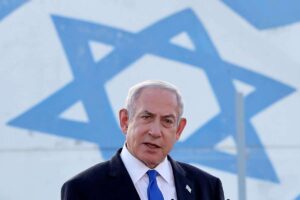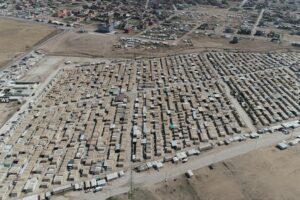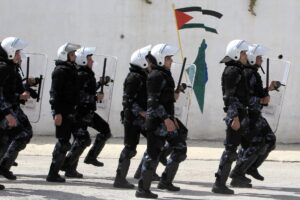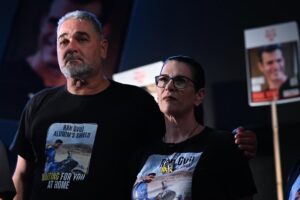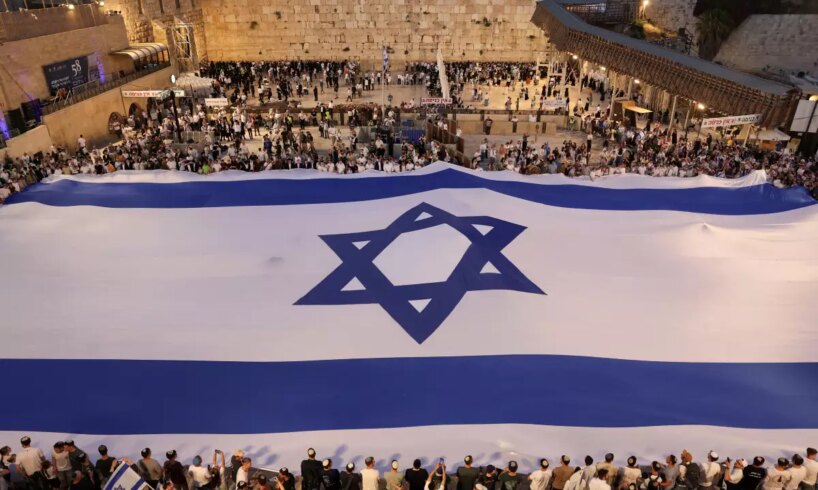
I stood beside the Torah reader at the synagogue of the Shimshoni community in Modi’in, wanting to witness the moment up close. He read the Torah’s final words, “before the eyes of all Israel” (Deuteronomy 34:12), and then the scroll fell silent, only to have a new scroll opened to its first words: “In the beginning, God created” (Genesis 1:1). I was moved. One cycle closed, and a new one opened immediately. The ending letter is Lamed and the beginning letter is Bet) – together they create the word Lev (לב) – a heart in Hebrerw: the Torah is the heart of the Jewish people and its 32 “paths of wisdom” (the numeric value of לב is 32) are the keys to understanding the world. As Sefer Yetzira teaches, “With 32 wondrous paths of wisdom, God engraved… and created His world.”
Throughout history, Jews have repeated this same motion of finishing the annual Torah reading and starting again countless times. It is a movement of renewal, a refusal to be crushed by death, a declaration that we begin again. This is not the futility of Sisyphus, cursed to roll a rock uphill only for it to fall just before the summit. This cycle has purpose. Every reading brings new insights. And it’s not just the individual who renews themselves, it’s the entire nation.
“In the beginning God created the heavens and the earth. And the earth was void and without form, with darkness over the face of the deep, and the spirit of God hovered over the waters. And God said, ‘Let there be light,’ and there was light…”
Out of the entire Bible, the heart is the Torah. Within the Torah, the essence is Genesis. Within Genesis, the opening portion. Within the portion, the opening verse. And at the center of it all: one word: “Bereshit” (In the beginning).
This single word is a promise. A declaration that no matter the moment, a new beginning is always possible. Even when life feels chaotic, even when darkness covers the abyss and hope seems lost, God’s spirit still hovers. Then, with resolve, we remember that word and cry out for renewal. Until the heavens open and a voice echoes through the world: “Let there be light.”
If the Torah is an ancient code of laws, why does it begin with such an extended introduction? Rashi opens his monumental commentary by asking a different version of the same question: Why begin with the story of creation and not with the first commandment?
His answer, nearly a thousand years ago, was prophetic and largely misunderstood until the modern era:
“If the nations of the world say to Israel, ‘You are thieves, for you conquered the lands of seven nations,’ we reply: ‘The entire earth belongs to the Holy One, Blessed be He. He created it and gave it to whomever He deemed right. He gave it to them and took it from them, and gave it to us.'”
Rashi lived during the First Crusade. In November 1095, Pope Urban II called on Christians to liberate the Holy Land from Muslim control. In response, not only knights but also mobs of Europeans answered the call, leaving devastation in their wake. Jewish communities along the Rhine—Speyer, Worms, and Mainz—were destroyed. Jews were raped, burned alive, forced to convert. Many chose death over forced baptism. The memorial prayer “Av Harachamim” (“Father of Mercy”), still recited almost every Shabbat, was composed in response to these massacres.
The trauma of that era echoes today, in the wake of the October 7 massacre.
Nearly a millennium after the Second Temple’s destruction, Rashi’s generation was trampled and persecuted. The Land of Israel was a distant dream; survival was the most pressing concern. Yet Rashi called on his generation, and those to come, to lift their gaze from the blood-soaked present and see the long arc of Jewish destiny: You will return home. The question is not if, only when. And when you do, you’ll face an ancient-new accusation: To whom does this land belong? It will not be just one nation challenging your claim, but “the nations of the world”, perhaps even the United Nations, accusing you of “occupation” and theft.
Today, we offer many types of responses—legal, security-based and diplomatic—but the world also needs to hear our full story. It starts with the Book of Books, with our origin as a nation, with the covenant of Abraham and the promise that this land was meant for his descendants. The biblical claim is also a moral and spiritual one. The Bible introduces to the world the concepts of morality, divine providence, and the sanctity of the human soul. These revelations are incomplete without the Land of Israel.
The Bible is not a personal religious text; it chronicles the journey of a particular people in their particular land. Even when exiled, our prayers and dreams always turned to this place, and the land waited for us. Despite efforts by others to settle it, it remained barren. Only when we began to return did it awaken and bloom, like a mother saving her milk for her children.
When the biblical figure Balaam described us as “a people that dwells alone, and is not counted among the nations” (Numbers 23:9), he captured a profound truth: the Jewish uniqueness, a separate historical course meant to bring good to the world. A people with an ancient message, exiled for two thousand years, who returned as the prophets had foretold. The words of one of those prophets, Isaiah son of Amoz of Jerusalem (8th Century BCE), are inscribed at the entrance to the United Nations building. The wars waged against us seek to halt this historic process, the Jewish people’s return to Zion and the fulfillment of their prophetic destiny for the benefit of all humanity.
Two years into the war, we still hope and pray for peace and the fulfillment of hostage release agreements. However, we must also prepare for disruptions. A dangerous falsehood is taking root among Western youth: the lie, propagated by the terrorist organization Hamas and their supporters, that Israel committed “genocide” in Gaza. This slander spreads across media and social platforms, largely unchallenged, and is influencing Western policymakers, and worse, the silent majority, who lack firm opinions on the conflict but are exposed almost exclusively to our enemies’ narrative.
This, too, can be reversed.
To those who claim that telling our truth is futile, that “the world is against us” anyeay and that spreading facts is a lost cause, we say: look around. Today, the world is saturated with eternal ideas from a small people in a small land. Our book is the world’s best sellet of all time. If we succeeded in that, we can also win the battle for global perception. Just remember Rashi. We need only to begin.
Dr. Yaakov Herzog, a brilliant diplomat and spokesman for the Jewish people on the world stage, and uncle of current President Isaac Herzog, once said of this first Rashi:
“It seems very unpolitical, even irrational. But I, after twenty years in diplomacy, am more convinced than ever that this is the key.”


